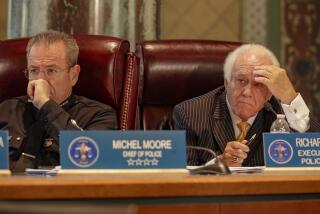Smokers Face Bar Workers’ BREATH Test
- Share via
Some smokers won’t like it, but here’s a fresh BREATH of air on the smoke ban in bars. . . . Last week’s column attacking those who defy the ban brought a litany of angry responses. Some readers were aghast that I wanted to deprive them of their final smoking sanctuary.
It bothers me little whether they smoke in bars. It bothers me greatly when people think they have the right to choose which laws they’re going to obey.
To the Lake Forest fellow who compared smokers’ civil disobedience to the Underground Railroad or the Warsaw Jews fighting oppression, oh please.
Bar owners who snidely defy the state ban against bar smoking have the upper hand in Orange County right now, with city code and police enforcement at a minimum in many places.
But here’s the BREATH that might water down their ashes.
It stands for Bar & Restaurant Employees Against Tobacco Hazards. It’s a division of the American Lung Assn. and it has a contract with the state to try to help smooth the transition on California’s 2-year-old smoking ban on bars and restaurants.
Though Sacramento-based BREATH has been taking the high road so far--through education instead of attacks--it’s bottom line message is clear: Bar owners who allow smoking are just as guilty of breaking the law as their smoking patrons.
Bar Owners Aren’t Off the Hook
Not everyone, of course, interprets the law that way.
My target last week was Tustin City Councilman Mike Doyle’s Revere House; he openly permits smoking in the bar connected to his restaurant. The police there have so narrowly defined the new smoking law, it gives him a free ticket.
Doyle told me he was not violating the law, even though his smoking customers might be. He also said the new law does not permit him to stop serving anybody in his bar because they’re smoking. That can only be a quantum leap over the section that says you don’t have to mess with any customers if you feel physically threatened by them.
BREATH legal expert Theresa Boschert responds that any bar owner who believes he or she is off the hook on the smoking ban is misreading the law.
Courts up and down California have been upholding such citations against bar owners, she said.
It’s a workplace law; bars are a workplace.
Boschert points to the most recent case in Alameda County. Court Commissioner Dan Grimmer there produced some tough language in finding a bar owner guilty of violating the smoking ban by allowing patrons to smoke. Like Councilman Doyle, the owner there claimed she met the legal requirements by posting no smoking signs. She also said she verbally warned her customers not to smoke. In my visit to the Revere House, no smokers received such a warning; they only got ashtrays. Plus a sign telling them that the owner opposes the smoking ban.
The Alameda County commissioner wrote: “The presence of ashtrays essentially cancels out the ‘no smoking’ message.” The court commissioner added that even more convincing to him, the defendant “continued service of customers who refused to abide with her no smoking request.”
Same as Doyle does.
The commissioner found her guilty with these words: “It’s the court’s conclusion that the defendant is only feigning compliance.”
Some of the reader responses to last week’s column:
“Who, pray tell, appointed you to advise me . . . “
This from reader William Koester of Anaheim, who added: “Are you compelled to [walk into the bar] at gunpoint? What smoker has ever deprived you of your right to just walk on by and keep on breathing fresh air to your heart’s content?”
“You really are a big mess.” From reader Doris Bonner of Buena Park.
“Nonsmoking Nazis,” from reader Robert Burnam.
But the most disturbing call came from Capt. Bob Schoenkopf of the Tustin Police Department. Though most polite, he was unhappy that I implied Doyle got special treatment because he is a city councilman. A lot of folks see it that way besides me, but the police captain has a right to say no favoritism exists.
Schoenkopf also took issue that I hadn’t adequately explained the process for police to respond to a complaint: A call goes to the county’s Tobacco Use Prevention Program, which then writes a letter to city code enforcement, which then writes to the bar owner. And after a couple of more steps, the whole thing gets assigned to the police, who then hit the bars with both uniformed and plainclothes officers. They then cite any smokers they see.
It’s Schoenkopf’s position that the smoking patrons can be cited, but not the bar owner.
“He hasn’t violated the law as written,” Schoenkopf said.
That’s the most disturbing part. Police here interpret the law differently than others.
BREATH points out that in Sacramento County last year, authorities found 90% noncompliance with the law at stand-alone bars. So the Sheriff’s Department went on a campaign to cite both patrons and owners. In less than a year, the turnaround is now 75% compliance.
Schoenkopf does make an excellent point that Tustin’s police officers have a heck of a lot of other responsibilities and can’t concentrate on just one issue. That’s true.
But if I were the Tustin police chief, I’d be so disturbed at the Revere House laughing in my face, I’d drive the bar crazy with undercover officers until the owner got the message.
Only one Revere House customer has been cited for smoking. Wonder how many those Sacramento cops would have found.
By the way, not all those column responses--close to 100 in all--came from angry smokers. Nearly half were supportive, from people who believe we obey all the laws, not just the ones we like.
John Oetken of Tustin makes a point that many critics miss: There are reasons nonsmokers want to go to a bar--maybe they’re with friends and just want to relax, or hear the music.
Writes Oetken: “I went to the Revere House for dinner with a group of about 25 people. We wanted to go to the bar before and after our meal, but we didn’t want to choke on the smoke. They lost a lot of business that night. None of us will ever go back.”
Jerry Hicks’ column appears Monday and Thursday. Readers may reach Hicks by calling (714) 564-1049 or e-mail to jerry.hicks@latimes.com.
More to Read
Sign up for Essential California
The most important California stories and recommendations in your inbox every morning.
You may occasionally receive promotional content from the Los Angeles Times.













